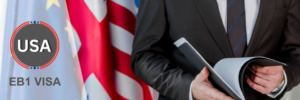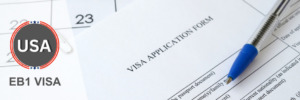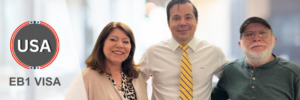EB1 Visa: Employment-Based Immigration for Extraordinary Ability, Outstanding Professors, and Multinational Executives
Welcome to Oliveira Lawyers, your trusted partner in U.S. immigration services. If you are an individual with exceptional abilities in your field, or if you’re an employer looking to sponsor such talent, the EB1 Visa provides a direct route to permanent residency in the U.S. Our team specializes in EB1 Visa services, assisting both individuals and companies in navigating the EB1 Visa process smoothly and efficiently.
At Oliveira Lawyers, we understand that obtaining an EB1 Visa can be a complex endeavor. Whether you’re applying as an individual with extraordinary abilities, an outstanding professor or researcher, or as a multinational executive or manager, our legal experts are here to guide you through every step of the process. Our goal is to ensure that your application is as strong as possible, positioning you for success in your journey toward U.S. residency.
EB1 Visa in the US
How To Get Started
#1 Contact us to get a free quote, or
#2 Schedule a Consultation now.
What is the EB1 Visa?
The EB1 Visa, a U.S. immigrant visa, allows individuals with extraordinary abilities, outstanding professors or researchers, and multinational executives or managers to obtain permanent residency in the U.S. This visa is particularly valuable for those who have demonstrated exceptional skill, expertise, or leadership in their field. The EB1 Visa offers a streamlined path to a Green Card, often bypassing the labor certification process, and provides the opportunity for permanent residence in the U.S. without requiring a specific job offer in some cases.
Definition and Purpose of the EB1 Visa
The EB1 Visa is designed to attract individuals with exceptional qualifications in fields such as science, arts, education, business, and athletics, as well as key executives and managers of multinational companies. Its primary goal is to foster economic and cultural growth in the U.S. by allowing top talent from around the world to contribute to critical sectors. The visa is part of the U.S. government’s strategy to retain global talent that strengthens U.S. industries and academia.
Eligibility Criteria for the Applicant and the Employer
The EB1 Visa sets forth specific criteria that must be met by both the applicant and, in certain cases, their employer.
Applicant Requirements:
- Extraordinary Ability: The applicant must demonstrate extraordinary ability in fields like sciences, arts, education, business, or athletics, supported by sustained national or international acclaim. This category does not require a job offer or labor certification.
- Outstanding Professors or Researchers: Applicants must prove international recognition for outstanding achievements in their academic field and have at least three years of experience in teaching or research. A job offer from a U.S. institution is required.
- Multinational Executive or Manager: The applicant must have been employed for at least one year by a firm or corporation and seek to enter the U.S. to continue service to that firm in an executive or managerial capacity.
Employer Requirements:
- For those applying as outstanding professors or researchers or as multinational executives or managers, the U.S. employer must meet certain qualifications, including the ability to offer a permanent position in a qualifying institution or business.
Supporting Documentation for the EB1 Visa
Applicants must provide robust documentation to support their eligibility for the EB1 Visa. These materials help establish their extraordinary abilities or qualifications as outstanding professors, researchers, or multinational executives.
Required Documents for Extraordinary Ability Applicants:
- Evidence of National or International Awards: Proof of significant awards or honors indicating national or international recognition in the applicant’s field.
- Publications or Media Coverage: Documentation showing that the applicant’s work has been published in major outlets or widely covered in media relevant to their field.
- Membership in Professional Associations: Evidence of membership in associations that require outstanding achievements as a prerequisite for admission.
Required Documents for Professors, Researchers, or Multinational Executives:
- Employment Contracts: Letters or contracts showing a permanent job offer from a U.S. employer in a qualifying position.
- Letters of Recommendation: Recommendations from experts in the applicant’s field attesting to their achievements and contributions.
- Organizational Documents: Proof that the U.S. employer meets the standards of a qualifying institution or business enterprise.
Legal Status and Compliance
Maintaining compliance with U.S. immigration laws is essential for EB1 Visa holders to retain their legal status. Applicants must adhere to visa conditions to ensure they remain eligible for permanent residency.
Key Compliance Factors:
- Maintaining Extraordinary Status: For individuals with extraordinary abilities, it is critical to continue demonstrating ongoing achievements in their field.
- Job Offer and Employment: For professors, researchers, and multinational executives, maintaining the job offer and continued employment in their specified capacity is vital for compliance.
Importance of Demonstrating Eligibility and Compliance
Applicants must submit comprehensive documentation that clearly demonstrates their qualifications for the EB1 Visa. This evidence is essential not only to meet the eligibility criteria but also to avoid delays or potential denial of the visa application.
Key Factors to Strengthen the Application:
National or International Recognition: Providing strong evidence of awards, publications, or other forms of recognition is essential to prove extraordinary ability.
Long-Term Employment Commitment: Professors, researchers, and executives should present documentation of a long-term commitment to their U.S. employer, ensuring they meet the visa’s permanent position requirements.
Challenges and Solutions for EB1 Visa Applicants
Applicants for the EB1 Visa may encounter challenges during the process. However, understanding these challenges and preparing adequately can improve the chances of success.
Proving Extraordinary Ability: There is no definitive list of what constitutes “extraordinary ability,” so applicants must submit overwhelming evidence of their qualifications. Comprehensive documentation, such as awards and published work, can help make a strong case for eligibility.
Maintaining Employment in the U.S.: For outstanding professors, researchers, and multinational executives, it is crucial to maintain employment with a U.S. employer. Preparing well-documented employment contracts and recommendations will support the application and ensure visa compliance.
By meeting the stringent requirements and preparing thorough documentation, applicants can enhance their chances of securing an EB1 Visa. Those with extraordinary abilities, outstanding academic achievements, or executive leadership roles in multinational companies can not only achieve permanent residency in the U.S. but also contribute to the nation’s economic and cultural development.
EB1 Visa in the US
How To Get Started
#1 Contact us to get a free quote, or
#2 Schedule a Consultation now.
EB1 Visa in the US
How To Get Started
#1 Contact us to get a free quote, or
#2 Schedule a Consultation now.
Navigating the EB1 Visa application process may seem daunting, but closely following each step can make the journey smoother and more manageable. This section provides a step-by-step guide to help you meet all requirements and successfully complete the EB1 Visa process.
Step-by-Step Guide to the EB1 Visa Application Process
1. Determine EB1 Visa Eligibility
Evaluate Your Qualifications: To qualify for an EB1 Visa, applicants must meet specific criteria under one of the following categories:
- EB1-A (Extraordinary Ability): Demonstrate sustained national or international acclaim in your field through awards, publications, or other major recognitions.
- EB1-B (Outstanding Professors and Researchers): Secure an offer from a U.S. employer and show a record of significant research or teaching achievements.
- EB1-C (Multinational Managers and Executives): Have worked for a qualifying foreign company and be transferred to a managerial or executive role in the U.S.
2. Gather Required Documentation
Compile Supporting Evidence: Prepare the necessary documentation according to your specific EB1 category:
- EB1-A: Awards, publications, media coverage, memberships in prestigious organizations, or evidence of contributions to your field.
- EB1-B: Employer’s job offer, proof of outstanding achievements, and letters of recommendation.
- EB1-C: Employment records showing managerial roles, proof of qualifying foreign company, and details of the U.S. business operation.
3. File Form I-140, Immigrant Petition for Alien Worker
- Complete and Submit Form I-140: The applicant or the sponsoring employer must file Form I-140 with U.S. Citizenship and Immigration Services (USCIS) to begin the EB1 Visa process.
- EB1-A applicants may self-petition and do not require a U.S. employer sponsor.
- EB1-B and EB1-C applicants need their U.S. employer to submit the petition on their behalf.
- Pay the Required Fees: Ensure all filing fees are paid promptly to avoid delays.
4. Wait for USCIS Processing and Receive Notification
- Monitor Case Status: After submission, USCIS will process the petition and notify the applicant of the outcome.
- Request for Evidence (RFE): If USCIS requires additional documents, the applicant must respond promptly to keep the process on track.
- Approval Notice: If approved, USCIS will issue an approval notice, allowing the applicant to proceed to the next step.
5. File Form DS-260 and Attend a Visa Interview (if outside the U.S.)
- Complete Form DS-260: Applicants outside the U.S. must submit the online immigrant visa application through the Department of State’s website.
- Schedule and Prepare for the Interview: Once the application is submitted, the applicant will schedule an interview at a U.S. Embassy or Consulate in their country of residence.
- Bring All Required Documentation: The applicant must bring the interview appointment letter, approval notice, passport, and other supporting documents.
- Interview Process: During the interview, a consular officer will assess the applicant’s eligibility for the EB1 Visa.
6. Adjustment of Status (if within the U.S.)
- File Form I-485: If the applicant is already in the U.S., they can file Form I-485 to adjust their status to permanent resident (green card holder) once Form I-140 is approved.
- Submit Supporting Documents: Include medical examination results and any required documentation to demonstrate eligibility for status adjustment.
- USCIS Decision: Once the application is processed, USCIS will notify the applicant of approval or request further evidence.
7. Enter the U.S. and Begin Employment (if applicable)
- Travel to the U.S.: With the approved EB1 Visa, the applicant can enter the U.S. and begin work in their qualified role.
- For EB1-C Managers or Executives: Start managing or directing the U.S. operation as outlined in the application.
- For EB1-B Professors or Researchers: Begin work at the U.S. institution in accordance with the job offer.
8. Maintain Status and Apply for Permanent Residency
- Ensure Compliance with Visa Terms: The applicant must follow all visa conditions to maintain status.
- Apply for Permanent Residency: In most cases, EB1 Visa holders can apply for a green card soon after entering the U.S. due to the visa’s priority nature.
Timeline and Processing Times
The EB1 Visa process can vary based on individual circumstances, embassy availability, and the complexity of the case. Below is a general estimate of the process timeline:
- USCIS Processing for Form I-140: 3-8 months
- Visa Interview Scheduling and Approval (if abroad): 2-4 months
- Adjustment of Status (if in the U.S.): 4-10 months
- Total Processing Time: 6-18 months (depending on the complexity of the case and visa category)
By carefully following these steps and providing thorough documentation, applicants can streamline the EB1 Visa process and improve their chances of success. Whether you qualify under extraordinary ability, outstanding research, or multinational executive roles, proper preparation will ensure a smoother transition to permanent residency in the U.S.
Common Challenges and Solutions
Applying for an EB1 Visa can present significant hurdles due to its stringent eligibility criteria, extensive documentation requirements, and the need to demonstrate extraordinary ability or achievement. Many applicants encounter difficulties during the process. Anticipating these challenges and preparing effective strategies to address them will substantially improve your chances of success. This section highlights common issues faced during the EB1 Visa application process and provides practical solutions to overcome them.
Common Issues Faced During the EB1 Visa Application Process
1. Proving Extraordinary Ability
Challenge: To qualify for an EB1 Visa, applicants must demonstrate extraordinary ability in their field through sustained national or international acclaim. Many find it difficult to gather the necessary evidence to meet this high standard.
Solution: Collect substantial evidence of your achievements, including awards, published material about your work, and memberships in prestigious organizations. Consider securing expert testimonials from recognized authorities in your field. A well-organized portfolio of achievements can significantly strengthen your application.
2. Providing Sufficient Documentation
Challenge: The EB1 Visa application requires extensive documentation, including proof of your accomplishments, work history, and ongoing recognition in your field. Incomplete or incorrect documentation often leads to delays or denials.
Solution: Utilize a comprehensive checklist to ensure all necessary documents are included. Carefully follow USCIS guidelines to avoid discrepancies. Working with an experienced immigration attorney can help ensure the accuracy and completeness of your documentation.
3. Demonstrating Continued Impact and Acclaim
Challenge: USCIS expects EB1 Visa applicants to show that they are still performing at the top of their field and receiving recognition. Failure to provide ongoing evidence of impact can weaken your case.
Solution: Provide updated records of your recent achievements and contributions to your field. This may include invitations to speak at conferences, ongoing publications, or collaborations with prominent figures. Demonstrating a consistent level of acclaim is crucial to maintaining the strength of your application.
4. Meeting the High Standard of Eligibility Criteria
Challenge: The EB1 Visa requires applicants to meet at least three of the ten specific criteria outlined by USCIS. Many find it challenging to meet these high benchmarks, especially in highly competitive fields.
Solution: Identify the criteria that best fit your accomplishments and gather strong supporting evidence. If you do not meet enough criteria, consider furthering your qualifications before applying. Working closely with an immigration lawyer can help you identify ways to strengthen your application.
5. Addressing Potential Gaps in Employment History
Challenge: Some applicants may face difficulties due to gaps in their employment or career progression, which could raise questions about their qualifications.
Solution: Explain any gaps in your employment history clearly and provide context, such as time spent on research, advanced training, or other activities that contributed to your professional development. Highlighting the significance of these periods can alleviate concerns.
Tips for Strengthening Your EB1 Visa Application
1. Comprehensive Portfolio of Achievements
Compile a well-organized portfolio of your significant achievements, including certificates, awards, and publications. Ensure that the documents clearly demonstrate your extraordinary ability and recognition in your field. This portfolio will serve as the foundation of your application.
2. Expert Testimonials
Obtain letters of recommendation from recognized experts in your field. These letters should highlight your extraordinary skills, contributions, and the impact of your work on the field. Strong endorsements from credible sources can significantly enhance your case.
3. Clear Evidence of Ongoing Recognition
Include recent invitations to speak, publications, or awards that show your continued recognition in your field. Demonstrating that you are still performing at an exceptional level is key to proving your eligibility for the EB1 Visa.
4. Thorough Documentation of Contributions
Provide detailed evidence of your contributions to your field, including articles, research, patents, or other significant works. Ensure that each document highlights your leadership and impact on the field, reinforcing your claim of extraordinary ability.
Addressing Employer Sponsorship and Employment Requirements
1. Employer Responsibilities in EB1 Visa Applications
If you are applying through an employer, ensure that your employer provides all required documentation, such as letters of support, employment contracts, and records of your contributions to the company. Collaboration between you and your employer is essential for a successful application.
2. Changes in Employment Status or Position
Notify USCIS promptly of any significant changes in your employment status, such as a promotion, change in role, or new project. These changes may require updates to your application to maintain consistency and eligibility.
3. Maintaining Compliance with Visa Requirements
Keep track of any changes in your career or work that might impact your EB1 Visa status. Ensure you continue to meet the criteria for extraordinary ability by maintaining a high level of achievement and recognition.
By addressing these challenges proactively and submitting a well-prepared application, you can improve your chances of securing the EB1 Visa successfully. Staying organized, maintaining detailed records, and working closely with immigration professionals will help you navigate the process smoothly and avoid potential delays.
EB1 Visa in the US
How To Get Started
#1 Contact us to get a free quote, or
#2 Schedule a Consultation now.
Once you receive approval for your EB1 Visa, it’s essential to follow several crucial steps to ensure compliance with U.S. immigration law and to fully utilize the opportunities provided by this extraordinary ability visa. This section will guide you through post-approval processes, including maintaining visa compliance, managing employment-related requirements, applying for renewals, and obtaining a Social Security Number. By understanding these steps, EB1 visa holders can ensure they stay compliant with U.S. regulations while maximizing their professional potential.
Initiating Employment Activities for EB1 Visa Holders
1. Starting Employment:
Requirement: As an EB1 visa holder, you are expected to begin employment in your field of extraordinary ability or continue in a role that matches the qualifications stated in your application. Significant changes in employment or position might require notifying U.S. Citizenship and Immigration Services (USCIS) or filing for an amendment.
Employment Documentation: Keep all necessary documents in order, such as your EB1 visa approval notice, employment contracts, or offer letters, to ensure smooth onboarding and compliance with immigration regulations.
Compliance with Employment Terms: Adhere to the job role and responsibilities as outlined in your original petition to avoid violating your visa terms.
Applying for a Social Security Number (SSN)
2. Applying for a Social Security Number (SSN):
Visit the Social Security Office: Shortly after your arrival in the U.S., you must visit your local Social Security office to apply for an SSN. This number is crucial for legal employment, financial transactions, and tax purposes.
Required Documents: Bring your EB1 visa, passport, Form I-94 (Arrival/Departure Record), and any employment documentation to support your application.
3. Benefits of an SSN:
Legal Employment: Your SSN is essential for processing legal wage payments and establishing your professional status in the U.S.
Financial Transactions: An SSN is required to manage personal and professional finances, such as opening bank accounts, applying for loans, or filing taxes.
Maintaining Legal Status and Compliance
4. Compliance with Visa Terms:
Authorized Stay: The EB1 visa allows an indefinite stay as long as the visa holder maintains employment in their field of extraordinary ability. However, you must ensure continuous compliance with the requirements of your visa category.
Timely Renewal: If needed, you can apply for an extension by submitting the appropriate forms before your visa expires to avoid any gaps in your legal status.
Changes in Employment: Should there be significant changes in your job role, company, or field, it may be necessary to file an amended petition with USCIS to maintain compliance with EB1 regulations.
5. Travel and Reentry:
Travel Caution: When traveling outside the U.S., ensure that your EB1 visa remains valid for reentry. Always carry essential documents, such as your visa, passport, and any related approval notices, for smooth reentry.
Reapplying for Visa Stamping: If your visa expires while you are abroad, you will need to obtain a new visa at a U.S. consulate before returning to the U.S.
Applying for Extensions of Stay
6. Filing for Extension:
Form Filing: To extend your stay or renew your EB1 status, your employer may need to file a petition supported by documentation that demonstrates your continued extraordinary ability and professional contributions.
Supporting Documents: Provide evidence of your ongoing professional achievements, financial records, and any other relevant documentation to support your request for extension.
Processing Time: Government processing times for visa extensions can be lengthy. If necessary, premium processing may expedite the decision.
Obtaining Dependent Visas (EB1 Dependent Visa)
7. Bringing Family Members:
Eligible Dependents: Your spouse and unmarried children under the age of 21 are eligible to apply for dependent visas, allowing them to accompany or join you in the U.S.
Employment Authorization: Spouses of EB1 visa holders can apply for employment authorization, enabling them to work legally in the U.S., while children are not permitted to work.
Documentation for Dependent Visa: To apply for dependent visas, submit marriage and birth certificates along with your EB1 visa approval notice.
Preparing for Possible Challenges
8. Maintaining Compliance:
Visa Violations: It’s crucial to continue meeting the requirements of the EB1 visa, particularly by staying employed in your area of extraordinary ability. Failing to do so can lead to visa revocation.
Document Management: Keep all visa-related documents, such as approval notices, employment records, and professional certifications, organized and up to date to avoid issues during audits or renewals.
9. Handling Denials or Issues:
Request for Evidence (RFE): If USCIS issues an RFE during your extension or amendment process, respond promptly with the required documentation to prevent delays.
Legal Assistance: If you encounter complex legal challenges regarding your visa status, consult an immigration attorney to ensure compliance and resolve potential issues.
Transitioning to Permanent Residency
10. Exploring Green Card Options:
Pathways to a Green Card: EB1 visa holders have a direct pathway to obtaining permanent residency (Green Card) through their extraordinary ability classification. This can lead to a smoother transition into a more permanent status in the U.S.
Consulting with Attorneys: Working with an immigration attorney can help you understand your Green Card eligibility and the process involved, ensuring a successful transition.
By following these steps, EB1 visa holders can successfully manage their stay in the U.S., continue excelling in their field, and maintain compliance with U.S. immigration laws.
EB1 Visa in the US
How To Get Started
#1 Contact us to get a free quote, or
#2 Schedule a Consultation now.
Hearing from individuals who have successfully obtained the EB1 Visa provides invaluable insights and reassurance for future applicants. Below, we share real-life success stories from clients who achieved their professional dreams in the U.S. with the help of Oliveira Lawyers. These testimonials underscore our dedication to excellence and the positive results we consistently deliver.
Real Success Stories
Dr. Lucas and Quantum Innovations Lab
Dr. Lucas, a renowned physicist from Brazil, needed an EB1 Visa to lead groundbreaking research in quantum mechanics in the U.S.
“The EB-1 Visa process was intimidating due to the high level of scrutiny, but Oliveira Lawyers handled everything with precision. They ensured that my achievements in physics were clearly presented, meeting the strict eligibility criteria. Thanks to their expert guidance, I am now heading a quantum research team in the U.S. I highly recommend their services!”
Sophia and Global Design Solutions
Sophia, an award-winning architect from Italy, required an EB1 Visa to expand her architectural firm to the U.S. market.
“Oliveira Lawyers made my EB1 Visa application process seamless. They meticulously prepared the documentation, showcasing my accomplishments in the architectural field. Their attention to detail ensured a smooth approval process. Today, my firm is thriving in the U.S., and I’m incredibly grateful for their expertise!”
Rajesh and Tech Global Enterprises
Rajesh, a distinguished software engineer from India, aimed to bring his multinational tech company’s operations to the U.S.
“Oliveira Lawyers were with me every step of the way, from structuring my EB1 Visa petition to navigating the complexities of the immigration process. Their professionalism and in-depth knowledge were crucial to my visa approval. I’m now successfully managing my company’s U.S. division, thanks to their outstanding support!”
How Our Services Make a Difference
Our experienced immigration attorneys and consultants are committed to providing expert assistance throughout every step of the EB1 Visa process. From the initial consultation to final approval, we ensure that every aspect of your application is handled with precision.
With years of experience in successfully managing EB1 cases, we have helped executives, researchers, and artists unlock new opportunities in the U.S. Our in-depth understanding of EB1 requirements minimizes the risk of delays and optimizes your chances of approval.
Contact Us for Your EB1 Visa Needs
If you are ready to leverage your extraordinary talent and pursue professional opportunities in the United States, Oliveira Lawyers is here to guide you. Contact us today to schedule a consultation and begin your EB1 Visa journey with confidence.
EB1 Visa in the US
How To Get Started
#1 Contact us to get a free quote, or
#2 Schedule a Consultation now.
1. What is an EB1 Visa, and how does it work?
The EB1 Visa is an immigrant visa that allows individuals with extraordinary abilities, outstanding professors or researchers, and multinational executives or managers to obtain permanent residency in the United States. Unlike other employment-based visas, the EB1 Visa does not require labor certification, making the process faster and more streamlined.
To qualify for an EB1 Visa, applicants must provide evidence of extraordinary achievements or a high-level executive role within a multinational company. This visa leads directly to a Green Card, offering a path to U.S. permanent residency.
2. Why should I apply for an EB1 Visa instead of another employment-based visa?
The EB1 Visa offers several distinct advantages over other employment-based visas:
- No labor certification required: Unlike EB2 or EB3 visas, the EB1 does not require a labor market test, which can speed up the application process.
- Priority Green Card access: The EB1 category is given priority in the Green Card queue, reducing wait times.
- Permanent residency for family members: Immediate family members, including spouses and children under 21, can also obtain Green Cards as dependents.
While the EB1 Visa has more stringent requirements, its advantages make it an attractive option for those who qualify.
3. What are the eligibility requirements for an EB1 Visa?
Eligibility for the EB1 Visa falls into three categories:
- Extraordinary Ability: Applicants must demonstrate sustained national or international acclaim in fields such as the arts, sciences, education, business, or athletics.
- Outstanding Professors and Researchers: Applicants need international recognition for outstanding achievements and at least three years of experience in their academic field.
- Multinational Executives or Managers: Applicants must have worked in an executive or managerial capacity for a qualifying multinational company for at least one year within the last three years.
An immigration attorney can help determine which category best suits your qualifications and guide you through the application process.
4. How long does it take to get an EB1 Visa approved?
EB1 Visa processing times vary based on USCIS caseloads and individual circumstances. Here are typical timelines:
- USCIS processing: 6 to 12 months for regular processing, depending on your location.
- Premium processing (optional): 15 calendar days for an additional fee.
To avoid delays, work closely with an immigration attorney to ensure all documents are correctly filed.
5. What documents are required for the EB1 Visa application?
A successful EB1 Visa application requires comprehensive documentation, including:
- Form I-140 (Immigrant Petition for Alien Worker)
- Evidence supporting your extraordinary ability or executive role
- Letters of recommendation from experts in your field
- Proof of achievements, such as awards, publications, or media coverage
- Employment verification letters, if applicable
- Passport copies and visa photographs
An immigration attorney can ensure all necessary documents are included and properly organized to strengthen your application.
6. What happens if the EB1 Visa application is denied?
If the EB1 Visa is denied, USCIS will issue a notice explaining the reasons. Common reasons include:
- Insufficient evidence of extraordinary ability or executive role
- Incomplete or inaccurate documentation
- Failure to meet the specific criteria of the EB1 category
In case of a denial, you may choose to file an appeal or reapply with additional evidence. Working with legal counsel can help address any deficiencies and improve the chances of approval on a second attempt.
7. How much does it cost to apply for an EB1 Visa?
The cost of applying for an EB1 Visa typically includes:
- Filing fee for Form I-140: $700
- Premium processing fee (optional): $2,500
- Attorney fees: Typically range from $5,000 to $10,000, depending on the complexity of the case
Applicants should also budget for additional expenses, such as document preparation and translation costs, if applicable.
8. Can I bring dependents on an EB1 Visa?
Yes, EB1 Visa holders can bring their spouse and children under 21 to the U.S. as dependents. Dependents will receive Green Cards once the principal applicant’s EB1 Visa is approved. Additionally:
- Work authorization: Spouses may apply for work authorization in the U.S.
- Educational access: Children can attend U.S. schools or universities but are not eligible to work.
As long as the principal EB1 Visa holder maintains their permanent residency, dependent status remains valid.
9. Can I change employers or job roles after receiving an EB1 Visa?
Yes, EB1 Visa holders may change employers or job roles without jeopardizing their Green Card status, provided the new position aligns with the category under which they applied. However, multinational executives or managers should consult with an immigration attorney before making any major career changes to ensure compliance with visa requirements.
10. What are the most common mistakes when applying for an EB1 Visa, and how can I avoid them?
The most frequent mistakes during the EB1 Visa application process include:
- Failing to provide sufficient documentation of extraordinary ability or executive role
- Misunderstanding the eligibility criteria for each category
- Inadequate preparation of supporting materials, such as letters of recommendation
To avoid these errors, it is crucial to consult with an experienced immigration attorney who can guide you through the process and ensure that all necessary documents meet USCIS standards.
11. Why should I hire an attorney to assist with the EB1 Visa process?
An immigration attorney offers valuable assistance throughout the EB1 Visa application by:
- Ensuring all forms and supporting documents are accurate and complete
- Assisting with requests for additional evidence from USCIS
- Advising on eligibility and helping select the appropriate category
- Preparing a comprehensive petition to strengthen your case
Hiring an attorney significantly increases your chances of success and minimizes the risk of costly errors during the application process.
By following these guidelines, you can navigate the EB1 Visa process smoothly, securing your path to permanent residency in the United States.










